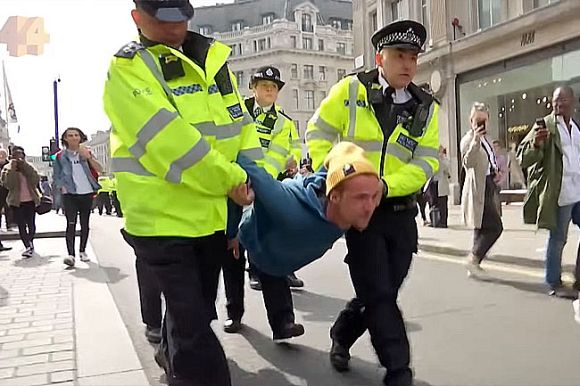A lawsuit against Greenpeace could have serious consequences against the right to protest, with Australia's leaders failing to take notice. Sue Arnold reports.
GREENPEACE USA has been sued for US$300 million (AU$477 million) by Dallas-based company Energy Transfer, the New York Times reported on 24 February.
Accused of masterminding the protests over the construction of the Dakota Access Pipeline near the Standing Rock Sioux Reservation around ten years ago, the poorly reported trial happening in North Dakota has profound ramifications.
The conservation organisation has also been accused of trespass, defamation, conspiracy and tortious interference with business.
The trial has been described as a bombshell lawsuit. In essence, if the company succeeds, both freedom of speech and peaceful protest will be inhibited if not made impossible.
Wikipedia provides a great background on the protest which is famous as a grassroots, Indigenous battle. The Washington Post called it a ‘national movement for Native Americans’. Thousands of people came to protest, including the single largest gathering of Native Americans in more than 100 years.
The Dakota Access Pipeline is a 1,886-kilometre underground oil pipeline. According to Wikipedia, the pipeline was planned as a subsidiary of Energy Transfer Partners.
More than 800,000 acres of Standing Rock’s land was at risk of being impacted by an oil spill which could contaminate drinking water and pollute spiritual water.
Standing Rock Tribal Chairman David Archambault II took the protest to the UN Human Rights Council. The tribes brought their case to the UN Permanent Forum on Indigenous Issues.
According to Wikipedia, Energy Transfer bulldozers cut a 3,200-metre long, 45-metre wide path through an area of the pipeline route that was sacred, containing possible burial sites and artifacts.
Dogs and pepper sprays were used against protesters. PBS Newshour reported law enforcement officers from six states, armoured personnel carriers, hundreds of police with concussion grenades, mace, tasers and batons.
Movie stars including Jane Fonda, veterans and business owners came to serve food to protesters and to act as human shields. Senator Bernie Sanders and the Reverend Jesse Jackson brought major support.
The current lawsuit is not the first time Energy Transfer has sued Greenpeace. In 2019, the corporation’s lawsuit alleged Greenpeace USA misled the public with false claims about the Standing Rock Sioux tribes’ sacred sites and the potential for the pipeline to contaminate the Missouri River.
The Federal Court dismissed as unfounded the charges of racketeering and defamation by Energy Transfer. At the time, counsel representing Greenpeace USA said the ruling was a “check on corporate efforts to silence dissent”.
The pipeline remains fully operation despite years of protests and legal challenges.
North Dakota is conservative and U.S. President Trump’s choice for interview secretary, Doug Burgum, was Governor of the state until last year. Kelcy Warren, Energy Transfer’s billionaire founder and the executive chairman, is a Trump supporter and a major donor.
He was once reported saying green activists ought to be “removed from the gene pool” and regards climate activists as a ‘significant threat to the energy industry’.
If Greenpeace loses and damages amount to US$300 million, this figure is more than ten times the group’s annual budget.
The trial and its outcome will be extremely important for Australian conservation organisations and potentially for environmental protests against big oil globally.
A precedent has already been set in Australia.
In a similar case involving Indigenous tribes and a pipeline, Aboriginal and Tiwi Islanders challenged the construction of an export pipeline from the Santos company’s offshore Barossa field project. The gasfield pipeline is planned to connect the Northern Territory to the existing Bayu-Undan pipeline which connects to Darwin.
The challenge was lost.
Santos sued for costs against the Environmental Defenders Office's (EDO) failed challenge to the Barossa gas project. Finding in favour of the corporation, the Federal Court ruled the legal firm had to pay $9 million in costs to Santos.
According to The Guardian, the company had sought information relating to the funding of the EDO’s proceedings by other third parties opposed to the project, some of whom were involved in the Stop Barossa Gas protest.
In a scathing judgement, Justice Natalie Charlesworth ruled that one of the EDO’s lawyers and a cultural heritage consultant had engaged in a form of “subtle coaching” in a meeting with Tiwi Islanders.
The judge found that evidence of the pipeline risking ‘intangible underwater heritage, including Crocodile Man songlines and an area of significance for the rainbow serpent Ampiji, was not “broadly representative” of the beliefs of the Tiwi people who would be affected by the pipeline’.
A UN special rapporteur raised major concerns over increasingly draconian laws that restrict citizens’ right to peaceful protests around Australia after a visit in September 2023.
Some of his report is worth repeating in full:
Draconian restrictions on the right to protest in several states are also very troubling. Peaceful protests are a legitimate exercise of the right to freedom of assembly and they enable citizens to mobilise their concerns and make them visible to public authorities.
I have also been informed that judicial review of government decisions is strictly procedural. This can lead to negative environmental outcomes where political decisions do not reflect expert advisory recommendations.
The imposition of low penalties for violations of environmental licenses is another issue of great concern.
Perhaps the most immediate and momentous opportunity for Australia is to incorporate the right to a healthy environment in its domestic legal order.
Doing so will require not only constitutional or statutory recognition of the Right, it will also require a review of a legal framework for environmental protection that is largely reactive and beneath international best practices.
This is where human rights can guide the transformation of law and policy: to avoid legalising hazardous levels of toxic pollution, to secure respect for the rights of Indigenous peoples, to enable informed public participation in environmental decision-making, to ensure the internalisation of environmental costs, to transition to zero waste and a circular economy, and to make the right to live in a toxic-free environment a reality for all.
Given the current state of environmental affairs in the U.S., with a federal election in Australia happening in the near future, the right to protest is on shaky grounds. Neither Prime Minister Anthony Albanese nor Opposition Leader Peter Dutton appear interested in environmental crises or democratic rights to protest.
Fossil fuel projects and forestry operations continue to wreak havoc on the nation’s biodiversity and environment. The UN rapporteur’s recommendations to the Government have fallen on deaf ears.
Sue Arnold is an IA columnist and freelance investigative journalist. You can follow Sue on Twitter @koalacrisis.
 This work is licensed under a Creative Commons Attribution-NonCommercial-NoDerivs 3.0 Australia License
This work is licensed under a Creative Commons Attribution-NonCommercial-NoDerivs 3.0 Australia License
Support independent journalism Subscribe to IA.















